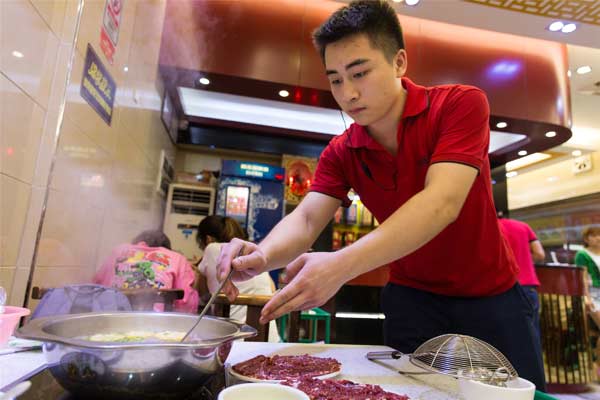
A restaurant attendant prepares beef for customers in Guangzhou, Guangdong province.(PROVIDED TO CHINA DAILY)
Imports of beef and other items from the South American country overtake those from Australia
Limited domestic output and rising per-capita incomes are pushing beef-hungry China to import the high-protein, low-fat meat in increasing quantities from Brazil.
About a year after recovering from a scare related to mad cow disease, Brazil has supplanted Australia as the biggest seller of beef to China.
A production deficit is widening in China, and imports are heading for a record.
Brazil's ample supplies and low prices helped companies including JBS SA, Minerva SA and Marfrig Global Foods SA to boost exports to China by 65 percent in the first half of the year.
While the Chinese eat far more pork than any other meat, per-capita consumption is falling. At the same time, demand for beef is increasing.
Only the U.S. imports more beef than China. Rapid economic growth over the past decade in China has created the world's second-largest economy and an expanding middle class that can afford more protein in their diets.
At the same time, Brazil has plenty of surplus beef, as domestic demand stagnates, and the country's exports are appealing to buyers after its currency plunged last year.
China ended a three-year-old embargo on Brazilian beef imports in May last year, imposed because of the mad cow disease epidemic that hit Brazil in 2012.
"China will have a major impact on the beef trade," said Miguel Gularte, head of JBS's Mercosul beef unit. "It's a fantastic market for Brazil" because the Asian country has "hundreds of millions of people moving to consume red meat," he said.
Per-capita consumption of beef in China will reach a record 3.864 kg this year, compared with 3.029 kg a decade ago, according to estimates by the Organization for Economic Co-Operation and Development.
But production has not kept pace, so China's imports this year will jump 22 percent to 1.23 million tons, including purchases by Hong Kong, according to the U.S. Department of Agriculture.
That is an almost fourfold increase from 2012, and imports now account for 36 percent of demand, up from 25 percent last year.
Wang Kai, a professor at Nanjing Agricultural University in Jiangsu province, said demand for lamb in China's western region, particularly in the Ningxia Hui and Xinjiang Uygur autonomous regions, and Qinghai and Gansu provinces, has quickly grown over the past five years, mainly because it is getting more expensive to raise cattle in western China, where the economy and livestock industry are less developed than in the eastern provinces.
Because of rising feed prices, limited grazing land and the breeding cycle, China's cattle-raising sector lags behind consumer demand, resulting in higher lamb prices over the past five years, according to a report released last December by the Chinese Academy of Agricultural Sciences.
"As China has found it impossible to grow all of the food it needs and has consequently formed closer ties with the world food market, demand for beef, mutton, fruit, wine and dairy products will certainly provide many opportunities for major agricultural produce exporters such as Chile, Brazil, Argentina and the United States."
Bilateral trade between China and Brazil stood at $71.59 billion in 2015, making China Brazil's largest export destination and source of imports, data released by the General Administration of Customs show.
Not only agricultural products, China has purchased large sums of raw materials from Brazil over the years, where it has also invested heavily in infrastructure, including hydropower facilities, construction machinery and automobile production. Chinese companies had invested $18.94 billion in Brazil by the end of 2014.
Australia had been China's top foreign beef supplier, but its output declined. That created an opportunity for Brazil, where a 33 percent plunge in its currency last year because of a recession and political scandal made its exports more appealing to buyers.


















































